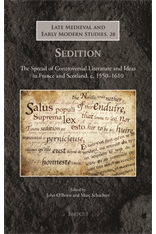
J. O'Brien, M. Schachter (dir.), Sedition. The Spread of Controversial Literature and Ideas in France and Scotland, c. 1550–1610
Sedition
The Spread of Controversial Literature and Ideas in France and Scotland, c. 1550–1610
J. O'Brien, M. Schachter (eds.)
Brepols, 2021
324 p. — ISBN: 978-2-503-58990-9 — EUR 90,00 excl. tax
This collection of eleven essays by an international team of experts investigates the political, literary, gendered, and historical dimensions of sedition and seditious works in the French Renaissance.
This interdisciplinary collection examines the notion of sedition in the period of the French Wars of Religion (1560–1600) and focuses not only on France itself, but also on Scotland during the reign of the French-born Mary Queen of Scots. Composed of eleven chapters written by an international team of experts, this volume concentrates on the political aspects of sedition rather than religious heresy, and covers writings and publications in a wide range of fields: politics, history, law, literature, and gender. A complementary feature of this collection is the spectrum of writings studied; they include edicts and treatises, pamphlets, broadsides, legal documents, dialogues, and satirical prose and poetry. Several chapters also address visual representations of sedition.
An Introduction and a Conclusion provide synthetic analyses of the material studied in the individual chapters. This is a collection which will appeal to readers with interests in the history of political ideas and thought, the comparative study of monarchical government, and concepts of tyranny and resistance, discord, rebellion, and revolt.
John O’Brien is Emeritus Professor of French and Marc Schachter is Associate Professor of French at the University of Durham, UK. The epicentre of their joint research is Montaigne and La Boétie.
Table of Contents
Acknowledgements, List of Figures
Introduction
Sedition: From Disobedience to Revolt — John O’Brien and Marc Schachter
The Language of Sedition
La sédition pendant les guerres civiles (France, 1560–1600): une histoire sans événement — Paul-Alexis Mellet
The Language of Religious Conflict: Seditions, Assemblies, Emotions, Violences… — George Hoffmann
Sources of Sedition
Heresy and Sedition in Pierre de Ronsard’s Discours des misères de ce temps (1562) and Pierre Boton’s La France divisée (c. 1595) — Andrea Frisch
The Role of John Knox and his Seditious Writings in the Outbreak of the French Wars of Religion — Éric Durot
Cicero the Revolutionary: Some Seditious Motifs in the Literature of the French Wars of Religion — John O’Brien
Genre and the Question of Sedition
‘Books with Sharp Teeth’: The Perception of Seditious Books in Early Modern France — Natalia Wawrzyniak
How Not to Be (and Sound) Seditious: The Prince de Condé’s Justifications for Starting the First War of Religion (1562–63) — Ullrich Langer
Political Crime in the Wars of Religion: François Brigard’s Sedition — Tom Hamilton
Gender, Sedition, and Literature
The Sempill Ballats: Gendering Sedition and Rebellion — Armel Dubois-Nayt
The Seditious Pleasures of the Prince in the Reveille-matin’s Denunciation of Tyranny — Marc Schachter
Styling Sedition in The Island of Hermaphrodites (L’Isle des hermaphrodites, 1605) — Kathleen Long
Conclusion
The Several Faces of Sedition — Mark Greengrass (with Dénes Harai)
Index